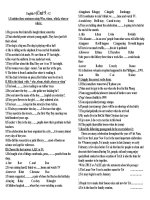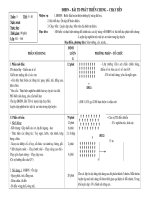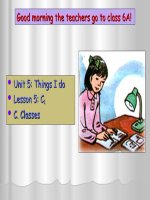unit 1relationshiplook TD
Bạn đang xem bản rút gọn của tài liệu. Xem và tải ngay bản đầy đủ của tài liệu tại đây (269.65 KB, 10 trang )
<span class='text_page_counter'>(1)</span>Quang Tri High School Class: 11A1.
<span class='text_page_counter'>(2)</span> UNIT 1: Period 10. Tuesday, September 28th, 2016 GENERATION GAP. - LOOKING BACK. Check-up: Answer the following questions 1. What kinds of family have you learnt? 2. What’s the current family trend in Viet Nam? 3. What are the reasons for this current trend? 4. Do you think children are happier growing up in extended families? why?/why not?.
<span class='text_page_counter'>(3)</span> UNIT 1: Period 10. Tuesday, September 28th, 2016GAP GENERATION - LOOKING BACK. Check-up: Answer the following questions Suggestions: 1. Single parent family, one-parent family, blended family… 2. Nuclear family. 3. - New couples prefer to take decisions autonomously so they want to lead their lives in their own terms with respect to outings, eating habits, guests etc. - Nuclear families allow couples and children to spend more time with each other. - Some people have to work far from their parents and settle down in a proper place. 4. (answers vary).
<span class='text_page_counter'>(4)</span> Tuesday, September 28th, • Pronunciation: Work in pairs 2016 UNIT 1: Period 10. - Write S (stressed words) and U (unstressed words): 1. content words: Nouns, Verbs, ADJ, ADV. 2. Articles( a, an,the) and prepositions (in, at, on, up..) 3. Negative Auxiliaries ( don’t, doesn’t, didn’t…) 4. Question words (who, what, where..?) 5. Demonstrations not preceding Nouns: this, that, these, those. 6. Relative pronouns: which, who, whom, where, when, why. 7. Possessive pronouns: mine, yours, his, hers, ours, theirs. 8. Pronouns: I, you, we, they, she ,he, me, her ,him, them…. 1. S 2 3 4. U S S. 5. S. 6. U. 7. S. 8. U.
<span class='text_page_counter'>(5)</span> Tuesday, September 28th, 2016. UNIT 1: Period 10. GENERATION GAP. - LOOKING BACK. • Pronunciation 1/ Identify the stressed words and put a stress mark (‘) before their stressed syllables in the statements. - Listen and check your answers.. ’. ’. ’. ’ ’. ’. • 1. Tim and his parents often argue about what time he should come home. • 2. Money can be a source of conflict for many families. • 3. Susan’s parents want her to do well in school, and if that doesn’t happen, her parents get angry, so she gets worried. • 4. Kate’s parents often complain that she doesn’t help clean the house.. ’ ’. ’ ’ ’ ’ ’. ’. ’. ’. ’ ’. ’ ’. ’. ’. ’. ’. ’ ’ ’ ’. ’ ’. ’. ’. ’. ’. * Practise reading the sentences with your partners..
<span class='text_page_counter'>(6)</span> Tuesday, September 28th, 2016 2. Identify the stressed words and put a stress mark before their stressed syllables. Then listen and check your answers. UNIT 1: Period 10. ’ ’. ’. ’. ’. ’. ’. 1. A: At what age were you allowed to stay at home alone? B: I don’t remember exactly. I think it was when I was nine or ten. 2. A: These jeans look really cool. Would you like to try them on? B: No. I don’t like them. I like those over there. 3. A: Do you think life is safer in the countryside? B: Yes, I do. It’s also cleaner.. ’. ’. ’. ’. ’. ’. ’. ’. ’ ’ ’ ’. ’. ’. ’ ’. ’. ’. ’. * Practise reading the exchanges with your partners.. ’. ’.
<span class='text_page_counter'>(7)</span> Vocabulary 1. Fill in the gaps with the words/phrases from the box Curfew Conflicts. generation gap nuclear family. 1. nuclear family 3. homestay. homestay. 2. generation gap 4. Conflicts. 5. curfew. 2. Find other compound nouns with the word family. Extended family. family name. One-parent family / single-parent family blended family stepfamily. FAMILY. family doctor family tree.
<span class='text_page_counter'>(8)</span> Grammar:.
<span class='text_page_counter'>(9)</span> Grammar 1. Complete the sentences with should or ought. • • • •. 1. ought 2. shouldn’t, ought 3. shouldn’t 4. oughtn’t, should.
<span class='text_page_counter'>(10)</span> 2. Complete the sentences with must/ mustn’t or have to/ has to and don’t have to/ doesn’t have to.. • • • •. 1. have to, has to 2. mustn’t 3. must 4. don’t have to.
<span class='text_page_counter'>(11)</span>






